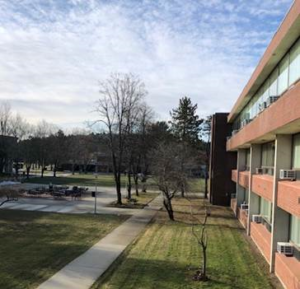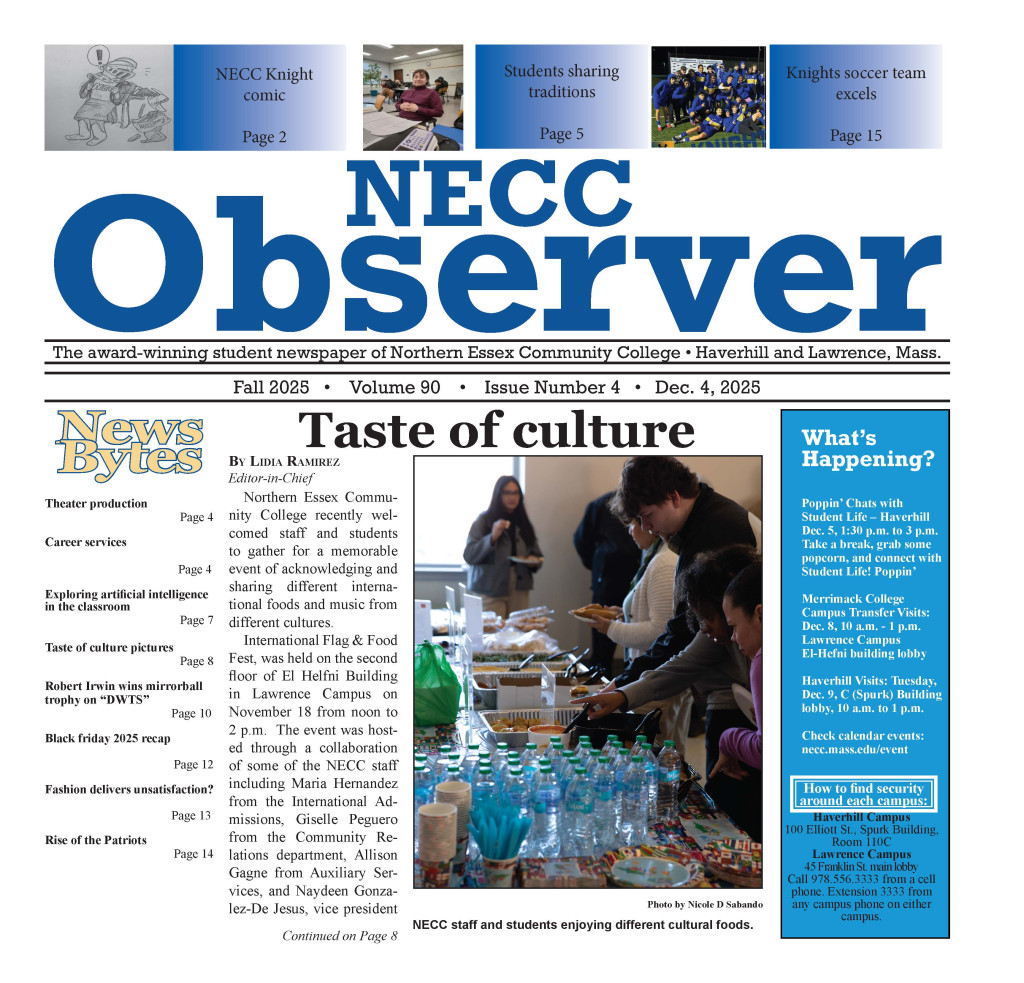Members of Northern Essex Community College Student Government Association and their college-employed advisor, who together hold weekly public SGA meetings at NECC, say that the indefinite closure of most NECC public services and operations due to the spread of novel coronavirus has plunged the college’s student government into unchartered, unfriendly territory but add that they think adaptation to the constantly escalating public health crisis will occur swiftly and efficiently.
The organization’s president, Samantha Cook, secretary/record-keeper, Chloe Upham, and advisor, Stephanie Haskell (who certifies student government votes and is also the coordinator of the NECC Student Life dept.), all say that meetings will move to a strictly digital format as long as the state of Massachusetts and NECC’s administration forbid the conducting of most public meetings, with Haskell saying digital meetings could begin as soon as Thu., April 2 (meetings are usually held on Thu.).
Meaning, the SGA plans to uphold statewide social distancing policies meant to slow the spread of the coronavirus. And while the SGA possesses the resources with which to convert in-person meetings to video conferences, members do worry that chief objectives of the SGA, like boosting low membership and bettering outreach between the organization and the student body, will be adversely affected by the cancelling of in-person SGA events. Such anxiety stems from members’ deeming in-person interaction paramount in attaining current top goals.
The SGA usually conducts its meetings as in-person/teleconference hybrids, using the virtual platform Zoom, owned by Zoom Video Communications, to make up for the physical distance between members who, at the time of a given meeting, are at NECC Lawrence, NECC Haverhill or away from either campus. The fact that the organization already utilizes Zoom routinely means that transition to solely digital communication will likely occur without much trouble, reasons Cook. Speaking to the Observer, she said, “For my members, I think it will be a completely seamless transition.”
Cook did, however, express that she is uncertain about how guests will be figured into Zoom meetings, saying she does not know whether or not guests will contribute to the conferences by silently communicating in a chat bar or audibly speaking via video call.
Haskell reports that the SGA also frequently uses other digital resources to execute its routine operations. Consequently, she thinks conforming to a remote setup will be a relatively painless process. She told the Observer, “This year we’ve been implementing different online tools and techniques. We have a Google Drive we’ve been saving stuff on. We’ve started a Blackboard [page]. We use Microsoft Teams so that all of our data from the past is actually digital now instead of being in a big folder sitting in our office. Since we were already moving that way, I don’t think we’ll run into that many difficult situations.”
How a transition to a remote framework will affect overall productivity seems uncertain to SGA associates, though. Haskell argues that a purely digital meeting medium would be less conducive to side conversations than in-person meetings and would, as a result, encourage unwavering focus on pro-student initiatives. But Upham’s thinking appears more conflicted. For while she has stated to the Observer that the SGA’s constitution allows for essential procedures like votes to take place during virtual meetings, she has also said, “We can’t really help students [as much as we would like to] because we can’t [physically] reach out to all of them.”
Especially impacted by recent limitations on outreach is the SGA’s effort to recruit new members who would continue current SGA initiatives after the graduation of today’s members. SGA members like Cook and Upham have framed recruitment as the most important SGA concern, and have recently proposed replacing executive board (elected official) meetings with tabling events whose focus is recruitment of general (nonelected) members. But now that tabling events are impossible, expanding membership has become a more arduous endeavor. And members like Cook are forced to rush to new, perhaps ineffective methods of advertisement. Cook has said, “It’s honestly a really rough situation…It makes me really anxious about our upcoming elections process, because we do need new members to carry on the student government legacy. We’re gonna try our best with social media outreach, but that will only reach students who have access to social media and know about us in the first place.”
Cook’s nervousness is compounded by the fact that rules regarding the coronavirus will indefinitely prevent the SGA from running public events for students, events like Valentine’s Day gatherings earlier this year, at NECC Haverhill and Lawrence, during which SGA members held talks about sexual health and distributed condoms to students. Such events are a staple of SGA on-campus affairs.
Other solutions Cook proposed when talking with the Observer include requesting to use the front pages of NECC’s main website and the college’s Blackboard website as advertising space, as these destinations attract perhaps the most views of any NECC-based internet resources. Haskell is also considering utilizing the SGA’s Blackboard page for outreach but adds that using mass emails to communicate with the student body could constitute an effective communication strategy as well.
Cook, Upham, and Haskell all say that SGA members have been contacting each-other mostly as friends concerned for each-other’s well being, and that spring break, which was scheduled to end on Mon., March 23, and the recent pandemic have diverted members’ attention from student government matters. Cook added in her interview that she has largely avoided discussing initiatives with her members in order to give them space to deal with the financial and family ramifications of the coronavirus: “I’ve been contacting them in the form of making sure that they’re OK and have the resources that they need, but I haven’t wanted them to stress about student government tasks.”
Cook, Upham, and Haskell all said in their interviews that students are encouraged to contact the SGA directly, via email, with their individual concerns about how the coronavirus will affect the SGA’s ability to push for student interests. Meaning, each of the three wishes to avoid sending out a reductive, disconfirming message and wants students to approach the SGA, an organization meant to serve as a liaison between faculty and students, individually with their unique worries so that said worries can be adequately addressed.
All three want students to think of the SGA as an active organization whose capacity has not at all been diminished by recent changes. Haskell perhaps delivered this message the most eloquently in saying, “Students should just know that the faculty, staff, and student leaders are all still here. We might not be physically right in front of you, but we’re all just a phone call, an email, or Zoom away. Nobody’s alone in this…Always reach out and ask.”



